|
|
|
Sort Order |
|
|
|
Items / Page
|
|
|
|
|
|
|
| Srl | Item |
| 1 |
ID:
135096
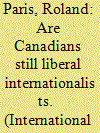

|
|
|
|
|
| Summary/Abstract |
Since coming into office in 2006, the government of Prime Minister Stephen Harper has rejected many of the symbols and practices of the liberal internationalist approach to foreign affairs that Canadian governments of all political stripes broadly embraced during the preceding six decades. As part of this change, the Harper government has also promoted a new narrative about Canada’s history and foreign policy, which encourages Canadians to change how they think about their country and its role in the world. By examining recent opinion surveys, this article asks whether Canadian public attitudes on foreign policy have shifted away from liberal internationalism and toward the Harper government's narrative since 2006.
|
|
|
|
|
|
|
|
|
|
|
|
|
|
|
|
| 2 |
ID:
137146


|
|
|
|
|
| Summary/Abstract |
More than a decade after the European Court of Justice’s “open skies” judgments, is the European Union (EU) now capable of asserting a leading role in the international aviation regime? This article approaches the EU’s external aviation policy through the lenses of role theory and, more precisely, through the threefold connotation of the concept of role: role conceptions, role expectations, and role performance. It finds that there is a converging tendency between the three dimensions and that the gap between external expectations and actual policy behaviour on the one hand, and the EU’s aspiration for a leading role in international aviation on the other, is diminishing. Over time, then, the EU could indeed transform from a regional trendsetter into a leading player in the international aviation regime.
|
|
|
|
|
|
|
|
|
|
|
|
|
|
|
|
| 3 |
ID:
153343
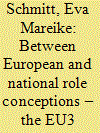

|
|
|
|
|
| Summary/Abstract |
This paper addresses whether Germany, France and the UK (the EU3) – with the EU in the background – can shape their own approach to a common Europeanised position or even a European role conception regarding the Iranian Nuclear Programme. As the EU3 initiative appears situated between Europeanisation and national role conceptions, it seems that the EU3 members – after a coherent start – were finally inclined to readapt themselves to certain of their national role conceptions, resulting in a “mix” of national and European role patterns in the process leading up to 2016. Currently, this mix hints at still-prevailing hindrances involved in genuine European conflict management, although this outcome holds the promise of greater European coherence in the future.
|
|
|
|
|
|
|
|
|
|
|
|
|
|
|
|
| 4 |
ID:
192957
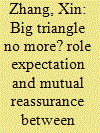

|
|
|
|
|
| Summary/Abstract |
I examine how mutual perception and role expectation evolve over time between China and Russia on each other's position in the international system and on bilateral relations in the context of shifting perceptions of the "Big Triangle" between the United States, Russia, and China since the late 1990s. Building on Role Theory in international relations, I use official texts, and experts' opinions during a series of key policy episodes to demonstrate that constantly adjusting role expectations and role enactment has become an important part of official Sino-Russian inter-state relations. Such relations have evolved from a more conservative, mutual role expectation of "do-no-harm" to more proactive expectations of joint efforts and policy coordination. This changing role expectation comes along with mutual reassurance against role mismanagement when both seek to substantiate the role of "significant others" beyond traditional military allies. During the 2010s, Sino-Russian bilateral relations started to be increasingly shaped by a discussion about the salience of US-China-Russia "Big Triangle."
|
|
|
|
|
|
|
|
|
|
|
|
|
|
|
|
| 5 |
ID:
163367


|
|
|
|
|
| Summary/Abstract |
There are diverging assessments of China’s role in resolving the nuclear crisis on the Korean Peninsula. China’s role has been characterised variously as a bystander, arbiter, catalyst and mediator over the years. This paper aims to clarify where China stands on North Korea and assesses the different phases of the Chinese approach to conflict resolution during the North Korean nuclear crisis. The main argument is that China wishes to maintain the regional status quo while appearing to adjust its position in line with the international community. China’s current duplicity stems from its different priorities and concerns to the remainder of the world, and can best be explained using a role theory analysis.
|
|
|
|
|
|
|
|
|
|
|
|
|
|
|
|
| 6 |
ID:
111635


|
|
|
|
|
| Publication |
2012.
|
| Summary/Abstract |
The paper suggests a dialogue between role theory and foreign policy learning literature. I argue that role theory, when conceptualized in the interactionist tradition of George Herbert Mead, can contribute analytical clarity to the literature on policy learning. By specifying role theory to account for various modes of "role taking," the constitutive social effects of individual or organizational learning for a given community become apparent. Furthermore, an interactionist reading of role theory advances the concept of "role taking" by complementing it with "role making." While the former connects societal expectations and individual or collective self-expectations and behavior, the later conceives learning as the interaction between individual creativity and societal expectation in the process of "as-if role taking." The illustrative cases of role making and taking reveal the creative effects of role making while accounting for the constraining impact of institutions and communal expectations. I conclude that role theory and (foreign policy) learning are powerful explanatory tools, but only if they are integrated to bridge the gap between agent and structure.
|
|
|
|
|
|
|
|
|
|
|
|
|
|
|
|
| 7 |
ID:
140280


|
|
|
|
|
| Summary/Abstract |
One of the shortcomings of foreign policy role theory is its tendency to black-box the state. Role theorists often assume a national role conception, without paying too much attention to the domestic political processes regarding how a role is selected to represent the state out of a number of potential competing roles. We develop a model of role contestation and role selection that draws on existing knowledge of foreign policy creation resulting from competition between governing elites and opposition, multi-party coalitions, cabinet dynamics, and bureaucratic politics. We incorporate expectations from role theory to explain how conflict over role selection may be resolved. The model is examined in light of several cases in immediate post-war Germany. We find that government and opposition dynamics are the primary sources of contestation over NRCs in our cases, some evidence for bureaucratic politics, and little evidence that coalition politics was at play. Finally, there were few instances in which role conflict resolution mechanisms were used.
|
|
|
|
|
|
|
|
|
|
|
|
|
|
|
|
| 8 |
ID:
139837
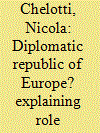

|
|
|
|
|
| Summary/Abstract |
Using an original database of 138 questionnaires, the article explores how national officials perceive their role when participating in European Union (EU) foreign policy committees. It first shows that they systematically assume not only intergovernmental but also supranational role conceptions: a good number of diplomats understand EU foreign policy as a collective political project with the objective to craft a common European policy. The article then investigates some scope conditions. If the overall picture is complex and heterogeneous, it reveals that socializing activities occur in this policy field. More specifically, the number of years spent in Brussels is a relatively strong predictor of a supranational attitude. At the same time, diplomats’ conceptions are formed also outside EU contexts: the structure and the pro-European opinions of the national polity affect the formation of a diplomat’s orientation. Remarkably, member states’ military power is a weak and non-significant variable in all the models tested.
|
|
|
|
|
|
|
|
|
|
|
|
|
|
|
|
| 9 |
ID:
167403
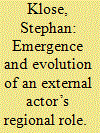

|
|
|
|
|
| Summary/Abstract |
The regional roles external actors play, such as ‘China’s role in Africa’ or ‘the US role in East Asia’, have long been popular subjects of analysis in the international relations literature. Yet, the emergence and evolution of these roles remains remarkably under-theorized. While some ‘new regionalist’ scholars have discussed the dynamics of an external actor’s regional involvement by referring to the concepts of ‘penetration’ and ‘socialization’, neither concept, this article argues, is sufficiently equipped to capture how external actors come to aspire and realize their regional roles. To address this shortcoming, the article employs an interactionist role theory perspective, which draws on the work of social psychologist George Herbert Mead. In following this perspective, the article argues that external actors develop regional role aspirations as they draw on their creativity and reflexivity to overcome experienced uncertainties. To realize these aspirations, the article suggests, external actors seek to cast significant others into corresponding roles. Alter-casting, the article argues in this context, is critical for understanding the (re)constitution of an external actor’s regional role, and thus a region’s social structure.
|
|
|
|
|
|
|
|
|
|
|
|
|
|
|
|
| 10 |
ID:
174734


|
|
|
|
|
| Summary/Abstract |
Indonesia has developed an internal model of reconciling the values of democracy and Islam; therefore it could pursue international activities for bringing the West and the Islamic world together. However, Indonesia’s international role as a bridge-builder between democratic values and Islam has limited effectiveness. In this paper the attempt is to investigate why Indonesia’s international activity as a bridge-builder between the West and the Muslim world is ineffective? The analysis shows, and this is the argument, that its limited effectiveness results from a conflict between the country’s conception and prescription roles. The assumptions are that Indonesia’s underlying objective in its foreign policy is to provide a tool for reconciling the West and the Muslim world (role conception); however an enactment of this role is affected by a dissonance between the authors of this role. The paper examines three empirical case studies at different levels of Indonesia’s external engagement: (1) civilizational and interfaith dialogues at the international level; (2) the Organization of Islamic Cooperation and Developing-8 at the inter-regional level; and (3) the Bali Democracy Forum at the regional level.
|
|
|
|
|
|
|
|
|
|
|
|
|
|
|
|
| 11 |
ID:
111634
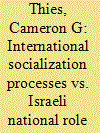

|
|
|
|
|
| Publication |
2012.
|
| Summary/Abstract |
This paper develops a theoretical approach to state socialization grounded in role theory. Role theory, in particular the role location process, offers a way to connect grand International Relations theory and inquiry to the analysis of specific foreign policy actions through the socialization concept. The role location process is presented as a stylized socialization "game" that models the interaction of a state, its socializer(s), and the interested audience as it reacts to cues and demands. This model is then applied to several episodes of early Israeli history (1948-1956) covering the emergence of the sovereign state through its achievement of small state status in the aftermath of the Suez Crisis.
|
|
|
|
|
|
|
|
|
|
|
|
|
|
|
|
| 12 |
ID:
176026


|
|
|
|
|
| Summary/Abstract |
Literature of small state’s foreign policy-making has mostly focused on the structural factors and less on the perceptions of the weak state. This article adopts a cross-level analysis framed by role theory to investigate Vietnam’s China policy. Two role conceptions are provided to illustrate Vietnam’s management of bilateral relations with China. The main demarcation of these two roles lies in their perceptions of hierarchy embedded in the asymmetric relations. The independent role is ego-driven and identity based that it views hierarchy as mainly the discrepancy of material power. By contrast, the interactive role is relational oriented and interprets hierarchy from the angle of distribution of responsibilities; the higher role expectation of the other actor and the pursuit of relational security are especially emphasized by this interactive role. Finally, this article utilizes the case of South China Sea dispute to explain how and why inter-role conflict and domestic role contestation occurred.
|
|
|
|
|
|
|
|
|
|
|
|
|
|
|
|
| 13 |
ID:
178496
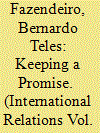

|
|
|
|
|
| Summary/Abstract |
States, governments and leaders often reject one another’s role prescriptions. They stick to enacting their role, what they consider to be their central purpose and main promise within a given international society. By applying the main tenets of role theory, this essay looks at the reasons why actors sometimes reject the prescriptions of others, including attempts at bargaining. Rather than claiming that those prescriptions are rejected on account of the pursuit of self-identity or ontological security, this essay suggests that those positions have more to do with defending the public credibility of one’s master role, the core promise made by an actor to (domestic and/or international) audiences. Master roles have to do with the main promises of an actor in a given social and political order, thereby providing credibility to a domestic and international audience. Without maintaining credibility, the actor is unlikely to be able to fulfil master and auxiliary roles as initially set out. The essay contributes to role theory in three ways: by looking beyond explanations centred on identification and ontological security, by conversely building upon public credibility, and also by showing how audiences and roles matter to illiberal regimes. To illustrate the argument, the essay addresses the government of Uzbekistan’s attempt to keep credibility in the face of Russian altercasting in the 1990s.
|
|
|
|
|
|
|
|
|
|
|
|
|
|
|
|
| 14 |
ID:
160463


|
|
|
|
|
| Summary/Abstract |
This article examines how role theory can enhance the middle-power literature in understanding the role preferences of middle powers. Rather than treating it as merely a function of material capability or good international citizenship, this article resituates middle power as a concept of international status that states aim to pursue through the enactment of role conceptions. Thus, it reinstates a conceptual distinction between ‘middle-power status’ and ‘middle-power roles’. The article suggests that the notion of role conceptions can analytically connect the status-seeking behaviour of middle powers with their foreign policy agenda. In so doing, it provides a more nuanced explanation of middle-power behaviour, which might differ between one middle power and another. Using Indonesia and South Korea as case studies of middle power, this article contends that foreign policymakers have strategically conceptualised and enacted several main roles that aim to capture historical experience, as well as ego and alter expectations, in order to pursue middle-power status. These role conceptions determine the foreign policy agenda of states in articulating their middle-power status.
|
|
|
|
|
|
|
|
|
|
|
|
|
|
|
|
| 15 |
ID:
148677
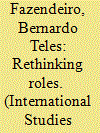

|
|
|
|
|
| Summary/Abstract |
This article argues for a practice of reflexive role ascription in International Relations (IR) to prevent actor normalization. Roles are useful and often applied in narratives to facilitate our understanding of particular actors or subject positions. Yet, recurrent and non-reflexive ascriptions give rise to normalization, shaping how actors become understood. Awareness of performativity, over-generalization, and over-determining roles would thus contribute to more nuanced understandings of actors and prevent limited yet insightful role ascriptions from becoming the norm. The article builds on two largely compatible turns in IR—the reflexive and narrative turns—with a view to enlarging the concept of role beyond the domain of interaction and drama. It thus reviews the manner in which roles have been conceptualized in IR and extends their definition. Then, by focusing on the notions of attribution, predication, and Judith Butler's performativity, the article propounds a two-level approach to reflexive role ascription–derived from Paul Ricoeur’s hermeneutics—that deters narratives and their roles from normalizing subject positions in IR.
|
|
|
|
|
|
|
|
|
|
|
|
|
|
|
|
| 16 |
ID:
187536


|
|
|
|
|
| Summary/Abstract |
The literature on International Relations theory has yet to align relational theory with role theory, despite the fact that these two theories share so much epistemological common ground. This article uses role theory to bridge the gap between the Confucian and Western conceptions of relationality, whose practitioners regard each other as strangers. With the support of role theory, the comparative analysis of relationality in this article has mainly focused on two different types of relations: prior rule-based relations and improvised relations. The differences in the cultural preparation for these two relations partially explain the plurality of the relational universe and the perception of stranger. Role theory is one way to reconnect the seemingly irreconcilable relational universes. To illustrate the value of a composite agenda of relational theory and role theory, the article will use Kim Jong-un of North Korea as its case. Confucian relations propose that, for all nations, the necessity of having a certain role relation is a more important agenda than insisting on exactly what role to take.
|
|
|
|
|
|
|
|
|
|
|
|
|
|
|
|
| 17 |
ID:
170750


|
|
|
|
|
| Summary/Abstract |
This article explores the scope conditions of national role conceptions as reference points for foreign policy decision making during crises. It aims to contribute to a refined perspective of the agency of new states undergoing socialization processes in relations with significant others. Drawing on a primary material consisting of interviews with Georgian and US officials, the article analyzes the significance of Georgia’s role conceptions in the country’s relations with the USA in relation to two major crises: the 2007 riots in Tbilisi and the 2008 war with Russia. The article posits that crises provide situational circumstances where the requirements of appropriate behavior associated with role expectations may enter into conflict with the demands of the immediate situation. In order to resolve ensuing role conflicts, actors face the need to both rationalize role expectations, and to compensate for departures from them. In turn, these strategies relate to the possibility for change and stability in role conceptions, and by extension their enactment in foreign policy. The analysis of the Georgian government’s management of the two crises demonstrates actions that implied both rationalization and compensation, aiming to retain the credibility of its existing role conceptions in the eyes of its US counterparts.
|
|
|
|
|
|
|
|
|
|
|
|
|
|
|
|
| 18 |
ID:
158729


|
|
|
|
|
| Summary/Abstract |
The dawn of the twenty-first century witnessed a new wave of multilateral initiatives in the Asia-Pacific. By integrating institutional balancing theory and role theory, the author proposes a new theoretical framework—‘balance of roles’—to explain the variations in institutional strategies by different states. It is argued that a state’s role conception will shape its institutional balancing strategies in an order transition period. An order defender, like the USA, is more likely to adopt exclusive institutional balancing to exclude its target from its dominated institutions. An order challenger, such as China, will choose both inclusive and exclusive institutional balancing to maximise its own power and legitimacy in a new international order. As a kingmaker, a proactive second-tier state is more likely to pick an inter-institutional balancing strategy to initiate new institutions for competing for influence with existing institutions. An institutionalised order transition might be more peaceful than widely perceived.
|
|
|
|
|
|
|
|
|
|
|
|
|
|
|
|
| 19 |
ID:
152096


|
|
|
|
|
| Summary/Abstract |
This paper aims to analyse why Indonesia projects democracy as a state identity by taking on the role of democracy promoter? This paper argues that Indonesia's aspiring role as a democracy promoter is not a manifestation of a firm and coherent democratic political culture, which is more likely to be a permanent feature of states. Thus, rather than seeing it as firmly established state identity, instead, Indonesia's democratic identity should be seen as role conception articulated by foreign policy elites in its quest for international prestige. Its role as a democracy promoter has enabled Indonesia to enhance its other roles conceptions such as a regional leader in Southeast Asia as well as a bridge-builder at the global level. However, this paper further argues that Indonesia's role as a democracy promoter has also been hindered due to the inter-role conflicts arising from its enactment of multiple roles. As a result, Indonesia's enactment of the role as democracy promoter has relatively less impactful towards democratization in the region. To substantiate this argument, the paper examines Indonesia's strategies in promoting democracy and human rights in three case studies, namely Indonesia's role in mainstreaming human rights in ASEAN, Indonesia's democracy promotion through the Bali Democracy Forum, and Indonesia's engagement towards democratization in Myanmar.
|
|
|
|
|
|
|
|
|
|
|
|
|
|
|
|
| 20 |
ID:
189986


|
|
|
|
|
| Summary/Abstract |
In recent years, scholars have devoted increased attention to the notion of roles in foreign policy analysis and international relations. However, role theory literature has so far less frequently explored re-conceptualising role conflict. To further understand the concept of role conflict, this article aims to unpacks the notion of international audiences. To do so, this article advances the application of role conflict by arguing the importance of notion of vertical role conflict that considers the different levels of international audiences, specifically regionally and globally. Building upon the symbolic interactionist conceptualisation of social interaction as a stage, regional and global levels can be seen as arenas for role-playing but with different expectations to fulfil. The article proposes two types of vertical role conflict, stemming from the difference between the regional and global levels. These theoretical claims will be elucidated through the study of Indonesia’s regional and global engagement in two areas: human rights and trade.
|
|
|
|
|
|
|
|
|
|
|
|
|
|
|
|
|
|
|
|
|